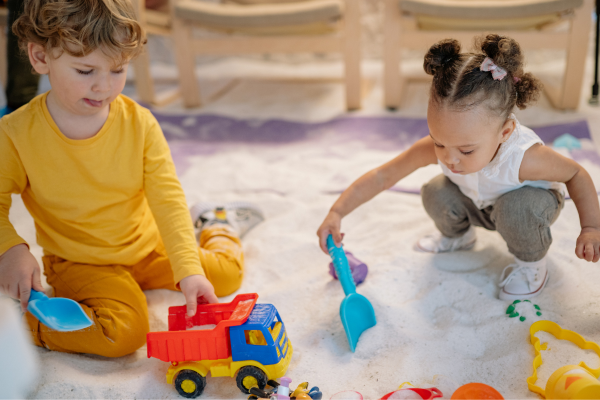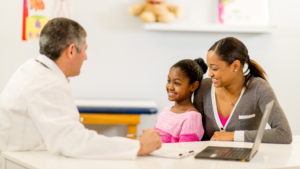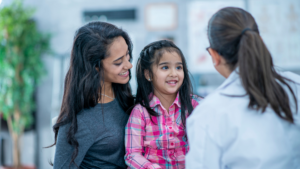When children learn they have birth siblings who live in another home, it brings up a lot of complex emotions for everyone involved. Here are some suggestions for talking to adopted children and birth siblings about adoption.
It is very common for adopted children to have birth siblings who are living with their birth parents. Similarly, many families have placed a child for adoption before choosing to start their family, meaning children may learn they have a birth sibling who was placed for adoption before they were born.
While these situations are common, it can be tricky for adoptive and birth parents alike to talk to children about siblings who don’t live with them. These types of discussions often raise concerns that explaining the relationship between birth siblings will bring up hurt feelings or questions parents aren’t sure how to address.
Even in families with strong open adoption relationships — where adopted children have an existing relationship with their birth parents and may have met their birth siblings — parents still may hesitate to introduce the fact that the children are related. Often there is anxiety over when to tell an adopted child about their birth siblings or how to navigate the questions that will come up when birth siblings meet for the first time.
Common Concerns When Telling Adopted Children About Birth Siblings
If you are wondering how to navigate relationships between your adopted child and their birth siblings, you are not alone. Some common concerns or questions adoptive parents have may include:
- Won’t they be confused about who their birth siblings are and/or why they aren’t living together?
- Will my child feel unloved or unwanted?
- Shouldn’t we just answer questions as they arise?
- Should we should wait until they’re older and able to fully understand all that goes into adoption decisions?
Sometimes these fears can get in the way of healthy relationships between adopted children and birth siblings. Below is some advice from The Cradle team on how to talk about birth siblings with your child.
Tips for Adoptive Parents Talking About Your Child’s Birth Siblings
Treat the discussion about birth siblings the same way you treat talking about adoption in general. Be open and honest with your children from the very beginning. Explain the situation in words they can understand and add to this explanation as they grow.
Communicate Openly and Early About Their Birth Siblings
The earlier you tell your child about their birth siblings, the better. It should simply be a part of the adoption story they’ve always known. Tip-toeing around the relationship may lead your child to think you are hiding something from them or that they should be ashamed of having birth siblings living with another family. Waiting until they ask a question or they reach some magical age may end up meaning that you never explain the relationship or that they don’t find out about their birth siblings until many years down the road. Additionally, the later you introduce this important piece of their story, the more shocking it may be to hear.
Validate Your Child’s Feelings
An adopted child may wonder why their birth parent couldn’t parent them but can parent another child. Assure them that they loved them very much and still do, but that at different times in someone’s life they are able to do different things.
Invite your child to express their questions and concerns. For example, they may be worried that they aren’t secure in your home. Assure them that they are, that you love them and that you will take care of them even though someone else is taking care of their siblings.
Advice for Birth Parents Talking About Siblings Who Were Placed for Adoption
Birth parents can feel an added burden during these conversations. You may want to shield the children you are parenting from any of your personal sadness around having placed a child for adoption. While this is a natural reaction, it can create a distance between you and your children around a topic that is very important to all of you.
Let Your Child See Your Full Range of Emotions
Acknowledge that even though you know their sibling is happy where they are, you still sometimes wish they were living with you. Then add in the context. Something like: “But if we had another child, I know I wouldn’t be able to take care of both you and them, even with your help.”
If the child you are parenting is younger than the child you placed, it could sound something like this: “When I chose Sally’s parents, I wanted very much to be her mommy myself. It was very hard for me to choose adoption for her. But I just couldn’t be the mommy I wanted for her. I couldn’t give her everything I am able to give to you. I have always loved her — that’s why I found them just for her. Now they are her parents, and they would be very sad if she wasn’t living with them. But you are still her brother and she is still your sister and you will always have each other.”
By sharing the fact that you are both sad that you aren’t parenting their sibling and also happy with the family you chose for them, you are actually explaining in simple terms that adoption is complex. Give yourself permission to show your child that you are sad about the situation even while you are confident with your decision. When they see you are happy that their birth sibling is thriving with their adoptive family, it gives your child permission to feel a mix of emotions too.
Realize that children have a right to feel sad or mad about the fact that their sibling lives in a different family. Acknowledge this. Tell them it was a hard decision and that you understand they may not like it. Use phrases like “adults need to make hard decisions sometimes.” Explain that not choosing adoption would have impacted all of you and use language appropriate for their age. For example, for young children you can say: “Sally can’t live with us. Her parents would be very sad not to have her in their family. She needs to live there.”
Talking to Children You Placed for Adoption
If you have an open adoption relationship with your child’s adoptive family, there may come a time when you need to talk to them about why they were placed for adoption, but their birth siblings were not.
For these conversations, you can use words like: “You know I never doubted my love for you, and I wanted very much to give you everything in the world. But I simply couldn’t at that time. It was hard for me to face that, but it was true, so I found a family who could give you what I was not able to. I am so happy with how this has worked out for all of us. The love that I have for your baby brother will never replace the love I have for you. I am just in a different place in my life now, so I am able to be the parent to him that your parent is to you.”
Whether you’re telling your adopted child about their birth siblings or speaking to a child you’re parenting about a birth sibling you placed for adoption, reassure them that no matter what, they have a brother or sister. No matter where their brother or sister lives, they are still siblings. Explain that they will always have a special connection and that you care enough to help them nurture that bond.
For guidance navigating open adoption challenges or relationships between adopted children and birth siblings, our adoption-competent counselors are here to help. Fill out our inquiry from to learn more or call us at 847-475-5800.














